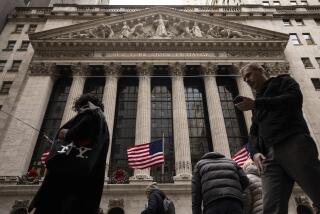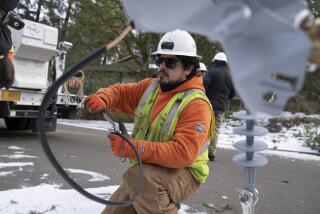Confidence Index Drops for 3rd Month : Economy: Post-election buoyancy is replaced by caution, Conference Board survey shows. Still-sluggish recovery is cited.
- Share via
NEW YORK — The burst of consumer confidence that followed Bill Clinton’s election receded for the third straight month in March as anxiety over layoffs, slow growth and possible tax hikes overshadowed the President’s plans for economic expansion, according to a survey released Tuesday.
The widely followed assessment by the Conference Board research group suggested a marked shift from the buoyant public mood after the 1992 presidential election. It indicated that consumers are likely to reduce spending in the months ahead.
“The household sentiment that we saw late last year had a lot to do with psychological factors . . . (about having) a new President, a chance for economic growth,” said William V. Sullivan, an economist for Dean Witter, Discover & Co. “The harsh reality of a sluggish economy apparently is beginning to grind down confidence.”
The Conference Board index of consumer confidence declined nearly 6 points to 62.6, compared to 68.5 in February, 76.7 in January and 78.1 in December.
The March reading was the lowest level since July. But it was significantly higher than a year ago, when the index totaled 56.5. During the recession, readings dropped below 50.
The consumer confidence index, which works off a 1985 base of 100, is derived from a survey sent to 5,000 households nationwide, covering questions ranging from home-buying plans to local job conditions.
It’s regarded as an important indicator of household financial and employment security, which plays a direct role in consumer willingness to borrow and spend. Consumer spending, in turn, is responsible for about two-thirds of the nation’s overall economic activity.
Fewer respondents in the March survey said they planned to buy a car, a home or household furnishings such as appliances in the next six months.
While recent economic data suggests modest economic growth, consumers have been especially discouraged by an extended bout of corporate layoffs throughout the first few months of the year by major companies such as International Business Machines Corp., Boeing Co. and Sears, Roebuck & Co.
Those layoffs and cutbacks show little sign of slowing down. On Monday, for example, Delta Air Lines announced that it is laying off 600 pilots, and Hughes Missile Systems Co. said it is eliminating about 2,000 engineering and management jobs in California and Arizona.
Economists say worries about a tax hike are also responsible for shaking American faith in the economic recovery.
Clinton’s economic stimulus plan calls for a combination of higher taxes and reduced government spending to trim the federal deficit and stimulate job growth.
“Consumer confidence had been sinking ever since he unveiled his economic plan,” said Robert A. Brusca, chief financial economist for Nikko Securities Co. International.
However, not all of the news was disappointing.
In a separate report, the Conference Board reported an uptick in a monthly survey of help-wanted advertising.
The Conference Board said its help-wanted advertising index advanced to the highest level in almost two years. The index rose to 98 in February after hovering between 90 and 95 for the last two years.
The board’s monthly survey of 51 newspapers nationwide is considered an accurate barometer of labor market conditions and the job supply.
More to Read
Inside the business of entertainment
The Wide Shot brings you news, analysis and insights on everything from streaming wars to production — and what it all means for the future.
You may occasionally receive promotional content from the Los Angeles Times.










